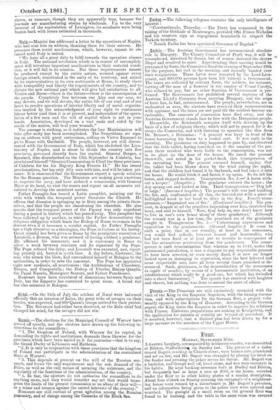lashig. — The Austrian Government has recommenced absolute rule in Hungary. The
County Committee of Pestle was, it will be remembered, dissolved by decree, but of course declared the decree illegal and resolved to meet. Apprehending their meeting would be prevented by force, the Committee fixed the evening of September 29th for the purpose, but met in the morning, and formally handed over their resignations. These latter were accepted by the Lord-Lien- mnant, and 600,000 persons have been left without a Government. The taxes are collected by military force, the soldiers, for instance, cutting off the nose of a forester in the employ of Count Carolyi, who refused to pay, but no other function of Government is per- formed. The Government law prohibited several captains of the Austrian Llo.yd's Company from entering Hungary, and the reign of force has, in fact, recommenced. The people, nevertheless, are as undaunted as ever, the electors have received their representatives with applause, and the taxes are not paid till the soldiers become un- endurable. The rumours of concession have died away, and the Austrian Government stands face to face with the Hungarian people. Meanwhile, the Reichsrath occupies itself with drawing up the basis of a law of religious liberty, which will not be passed, for it de- stroys the Concordat, and with listening to speeches like this from Dr. Brauner, a Bohemian: " A peasant was busy in front of his house harnessing his horse to a loaded cart. It was early in the morning. The gendarme on duty happened to pass by, and observed that the little tablet, having inscribed on it the number of the per- sons there resident who were liable to the conscription, was not in its place on the door of the house. He taxed the peasant therewith, and noted in his pocket-book this transgression of the recruiting law. The peasant excused himself, saying that the tablet had been blown down by the wind during the night, and that the children had found it by daybreak, and had taken it into the house. He would fetch it and fasten it up again. So he left his horse, and stepped in-doors. Transgression No. 2.—' A horse with- out a keeper.' (Laughter.) The gendarme entered the house ; the dog sprang out and barked at him. Third transgression.—' Dog left at large.' (Increased laughter.) The peasant's wife was just kindling the fire, and, confounded at all this, she -hurried out with a piece of half-lighted wood in her hand to drive in the dog. Fourth trans- gression.—' Imprudent use of fire.' (Continued laughter.) The pea- sant, in despair at all the penalties impending over him, scratched his head, and said to himself, Now, God help us, one don't know how to live in one's own house along'of these gendarmes.' Although the remark was in a low tone, the practised ear of the gendarme caught it. Transgression No. 5.—' Unbecoming expressions and opposition to the gendarmerie. (General laughter.) It came to such a point, that in our country, at least in the communes, you could find nobody, however honest and honourable, who had not been fined or at least put to trouble in consequence of the like accusations proceeding from the gendarmes. The conse- quence is such demoralization that whereas up to 1848, under the patrimonial jurisdiction, it was a disgrace to any respectable peasant to have been arrested, or even merely fined, it is now no longer looked upon as damaging to reputation, since the best behaved and most respectable men have all been several times punished or de- nounced. Such, gentlemen, is the demoralization of the communes in capite et tnembtis, by means of a bureaucratic institution, of an establishment which might be a good one, but which has dwindled into a sheer bureaucracy." The speech was received with laughter and cheers, but nothing was done to amend the state of affairs.






























 Previous page
Previous page